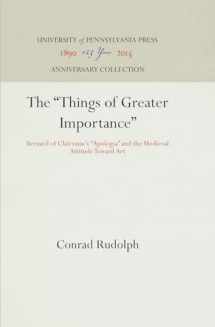
The "Things of Greater Importance": Bernard of Clairvaux's "Apologia" and the Medieval Attitude Toward Art (Anniversary Collection)
ISBN-13:
9780812281811
ISBN-10:
0812281810
Edition:
Reprint 2016 ed.
Author:
Conrad Rudolph
Publication date:
1990
Publisher:
University of Pennsylvania Press Anniversary Collection
Format:
Hardcover
424 pages
FREE US shipping
Book details
ISBN-13:
9780812281811
ISBN-10:
0812281810
Edition:
Reprint 2016 ed.
Author:
Conrad Rudolph
Publication date:
1990
Publisher:
University of Pennsylvania Press Anniversary Collection
Format:
Hardcover
424 pages
Summary
The "Things of Greater Importance": Bernard of Clairvaux's "Apologia" and the Medieval Attitude Toward Art (Anniversary Collection) (ISBN-13: 9780812281811 and ISBN-10: 0812281810), written by authors
Conrad Rudolph, was published by University of Pennsylvania Press Anniversary Collection in 1990.
With an overall rating of 4.5 stars, it's a notable title among other
books. You can easily purchase or rent The "Things of Greater Importance": Bernard of Clairvaux's "Apologia" and the Medieval Attitude Toward Art (Anniversary Collection) (Hardcover) from BooksRun,
along with many other new and used
books
and textbooks.
And, if you're looking to sell your copy, our current buyback offer is $0.3.
Description
The "Things of Greater Importance" provides a close look into the social and cultural context of medieval art, primarily as expressed in Bernard of Clairvaux's Apologia, the central document in the greatest artistic controversy to occur in the West prior to the Reformation and the most important source we have for understanding medieval attitudes toward art. Bernard wrote the Apologia during the medieval efflorescence of monumental sculpture and stained glass, of advanced architecture, of pilgrimage art, of high Romanesque, and of the origins of Gothic art.Rudolph places the Apologia, traditionally seen as a condemnation either of all religious art or of all monastic art, in a broader context, using it to explore the role of art in medieval society. He shows that Bernard was interested in the impact of art on contemporary monasticism in a more complex way than previously believed. The book offers the most thorough study available of the theoretical basis of medieval art as it functioned in society; and its implications for the art of both the Romanesque and Gothic periods, which were spanned by Bernard's life, are significant.


We would LOVE it if you could help us and other readers by reviewing the book
Book review

Congratulations! We have received your book review.
{user}
{createdAt}
by {truncated_author}


